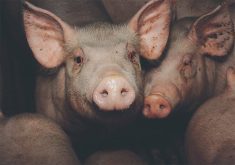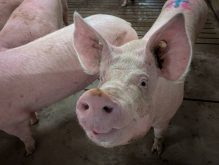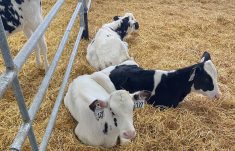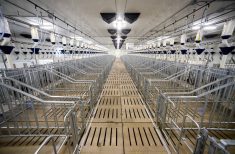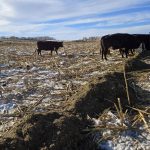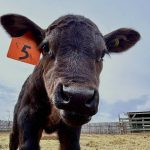Quebec-based Olymel becomes the latest major processor to bow to consumer pressure to change how it houses pregnant sows
Another major Canadian pork processor has announced it will ban the use of gestations stalls in the coming years.
The Quebec-based Olymel says it will phase out gestation stalls over the next decade.
“We’ve been thinking about this for a long time, we’ve been talking to our partners and reading expert opinion,” said Olymel spokesman Richard Vigneault. “And we plan to deliver animals that have no relation to this method of breeding.”
Gestation stall-free pork is also something Olymel’s clients have been asking for, while their suppliers have been expecting the move, Vigneault said.
Read Also

THROWBACK: Pro tips for a calving crisis
This article from 2024 walked farmers through common calving issues, and when the dystocia is serious enough that you need…
“This path is inevitable, there is no turning back on this,” he said, noting the European Union already has a ban on sow crates in place.
Many big-name retailers have also adopted purchase policies excluding the use of pork produced with gestation stalls.
Companies such as McDonald’s, Burger King, Costco, Sysco and Wendy’s all have plans to phase out gestation stall pork, or have already banned the use outright.
Smithfield, Hormel and Maple Leaf have pledged to end the use of gestation crates at their company-owned facilities by 2017, while Cargill is already 50 per cent crate free.
Nine U.S. states have also passed laws to ban gestation stalls.
Olymel’s announcement drew praise from Humane Society International (HSI), which has long opposed the use of gestation stalls.
“Olymel’s decision further highlights the fact that gestation crates have no future in the pork industry,” said HSI Canada campaigner Sayara Thurston. “No pregnant sow should spend even one day in a cruel gestation crate, and we encourage the rest of the industry to heed Olymel’s call and take immediate steps to shift away from their use.”
HSI is also urging the federal government to assist the pork industry in moving to group-housing systems by providing transition funds.
The Manitoba Pork Council (MPC) estimates it will cost approximately $600 per sow for producers to transition to an open-housing system and is working to help producers make the transition by 2025 as consensus on the issues becomes clear.
“Confining an animal for most of its life in a box in which it is not able to turn around does not provide a decent life… We’ve got to treat animals right, and the gestation stalls have got to go,” said Temple Grandin, speaking to HSI about the issue.
Last winter, a video shot in an Interlake weanling facility by activist group Mercy For Animals (MFA) was broadcast nationally, bringing the issue of gestation stalls back into public view.
MFA hoped the grainy footage showing sows in gestation stalls would spur people to pressure grocers and processors into banning the practice.
Olymel, which recently purchased Big Sky Farms in Saskatchewan, said it has now included its decision to phase out crates in its animal welfare policy, which indicates that open housing would provide benefits including allowing “sows to better express natural behaviours, benefit from greater freedom of movement, better socialization and a higher level of welfare.”
HSI, in its release, noted “the importance of Olymel’s decision in view of the ongoing review of the Code of Practice for the Care and Handling of Pigs in Canada.”
“If the updated code is to be relevant for Canadian producers and respected in international markets, the code development committee must take into account the overwhelming global trend away from the use of gestation crates and include a timeline for the complete elimination of these confinement systems from the Canadian pork industry.”
The National Farm Animal Care Council, which oversees the development of codes of practice for farm animals, said in December it expects to meet a June 1 target to begin the public comment period on the revised code for pigs.
Big Sky’s founder Florian Possberg, in his role as chair of the NFACC pig code committee, said in a release last week that gestation stalls, along with space allowance and pain mitigation, are “the most sensitive (issues) and we have looked at them in depth to find the best approach.”
Those three issues, he said, “will likely be the lightning rods when the draft code comes out for public comment and that feedback will help shape the final document.”



